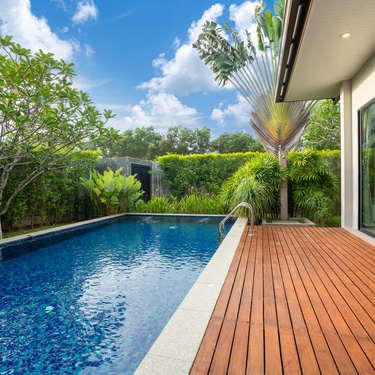
Adding a pool to your home is an exciting decision, but with so many options, figuring out what’s best for your space, needs, and budget can be challenging. Whether you're dreaming of summer relaxation or envisioning the perfect spot for family gatherings, choosing the right pool requires careful consideration. Here’s how to decide which type of pool works for your home.
Assess Your Needs
Think about how you plan to use the pool—whether for relaxation, kids’ play, exercise, or entertaining guests. Your primary goal should shape your decisions about the pool's size, style, and features. An infinity pool creates a luxurious vibe for entertaining, while a lap pool suits fitness enthusiasts. Defining your purpose helps ensure the pool meets your wants and needs.
Evaluate Your Space
Look over your backyard or other potential pool site, as not every space suits every pool type. Measure the area to ensure the pool will fit without overcrowding. Consider how sunlight and shade may affect its usability—sunlight will warm the pool, while shade could offer a comfy lounging spot. Factor in any nearby landscaping to ensure the pool complements other outdoor features.
Understand Different Pool Types
Understanding the different kinds of pools will help you select the right one for your home. There’s a pool for every need, from infinity pools to plunge pools.
Infinity pools are luxurious, creating the illusion of water flowing endlessly into the horizon, which is perfect if you have a scenic view to highlight. Lap pools are sleek and functional, ideal if health and fitness are your top priorities. Plunge pools are compact and cost-effective, making them great for relaxation in smaller spaces.
Researching these options will help you find a pool style that fits your home and how you intend to use it.
Review Your Budget
Pools can be a significant investment, so it’s essential to establish your budget before making any commitments. Installation costs vary widely depending on the pool type, size, and materials. You’ll also need to consider long-term maintenance expenses, including cleaning, chemicals, and water usage. You might want to budget for optional upgrades such as heating, LED lighting, or automatic covers.
Knowing your budget beforehand ensures you can select a pool that’s both perfect for your home and financially manageable.
Check Local Regulations
Before you commit to a pool, be sure to investigate any relevant local policies or regulations. Zoning laws, building codes, and permit requirements vary widely, and failing to comply might lead to costly delays or modifications.
Learning how to decide which type of pool works for your home is all about balancing your needs, space, budget, and local requirements. By assessing these factors and understanding the various styles available, you’re well on your way to finding the perfect addition to your home.
Bio: Casey is a passionate copyeditor highly motivated to provide compelling SEO content in the digital marketing space. Her expertise includes a vast range of industries from highly technical, consumer, and lifestyle-based, with an emphasis on attention to detail and readability.

























